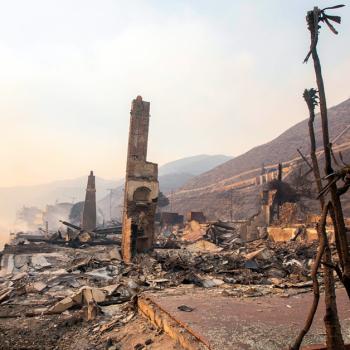Lectionary Reflections
John 4:5-42
March 23, 2014
I have a big blue plastic bucket that I fill with water and Pine Sol and use to mop my kitchen floor and my bathroom floors. The handle has come off on one side, so it's awkward to move from one room to another, but at least I have a bucket. Most people have a bucket in their house somewhere. Buckets have many uses. They hold things. They help you clean, garden, and water. If you were thirsty and standing by a well, you would need a bucket if you hoped to get a drink of water out of the well.
If I didn't have a bucket, I couldn't do my work. What would hold the disinfectant and hot water I need to mop my kitchen floor? How would I carry fertilizer out to my two red oak trees in front of my house? How would I carry the water I need to flush a stopped-up toilet? If I didn't have a bucket how would I do my work?
The woman at the well knows the value of a bucket. When she says, "You have no bucket and the well is deep," she is making an accurate assessment of the situation on the basis of appearances. She is saying, in effect, "The task is monumental and you do not have the means to accomplish it."
I hear her voice often when I am standing next to a deep well with no bucket, when I am facing a situation that exceeds my human abilities alone to address. Maybe you have just been given more responsibility at work (and no pay increase) and wonder how you are possibly going to be able to fulfill these obligations. The well is deep and you have no bucket. Maybe a loved one is struggling with an addiction and you feel helpless in the face of its power over them. The well is deep and you have no bucket. We may feel this way in the face of the suffering of people in our own communities, children undergoing abuse, people without healthcare, the homeless who live a hidden existence even in affluent communities. The well is deep and we have no bucket.
"You have no bucket and the well is deep," says the woman at the well, as Jesus, the one who alone can quench the thirst within her, sits next to the well.
The Gospel of John reveals Jesus' identity through a series of episodes that New Testament scholar Alan Culpepper calls "recognition scenes." There are many such encounter scenes in the Gospel. Jesus has interchanges with the royal official, the invalid at Bethzatha, the crowds, the disciples (both individually and as a group), the woman caught in adultery, Mary, Martha, and Lazarus, the High Priest and Pilate. These encounters are opportunities for people to recognize Jesus as the Son of God, the Word made flesh, and share the good news with others. Some do, like the woman in this scene who goes and tells her neighbors about Jesus. Some don't, like the High Priest and the crowds. And some recognize him but do not have the courage to make a public witness, like Nicodemus and, in my opinion, Pilate.
The thing that stands in the way of people recognizing Jesus in John's Gospel is their tendency to look only as deep as appearances, to stay at the literal level rather than go deeper with Jesus to the spiritual level. Notice the literal questions asked by Nicodemus (John 3), the woman at the well (John 4), and the man at the pool (John 5).
"How can a person enter back into the womb and be born again?" (Jn. 3:4), Nicodemus asks, even as he is standing before Jesus, the one who brings new birth.
"I have no one to put me in the water when the water is stirred up…" (Jn. 5: 7), says the invalid at the pool of Bethzatha, while Jesus, the source of healing stands next to him.
"Sir, you have no bucket, and the well is deep," says the woman at the well (Jn. 4:11).
With Nicodemus, Jesus is talking about new birth of the inner person through the Holy Spirit.
With the invalid by the pool, Jesus is talking about healing that comes from God, not the sporadic bubbling of a hot spring that legend attributes to angelic activity.
With the woman at the well, Jesus is talking about spiritual sustenance, the living water that you don't need a bucket to receive.
That sustenance is available on any occasion when we stand next to a deep well with no bucket.
This woman is entangled in a situation, personally and in relation to the community, which she cannot solve or harmonize. She has no means to gain dignity or community. Such a task is too large for her. If it had ever been possible, that chance was a thing of the past. She is reduced to seeking her sustenance, drawing water, at the hottest time of day to avoid the derision of others who might be at the well. She has three strikes against her with regard to being spoken to, much less respected, by a Jewish male. She is female; she has a sketchy relationship history; and she is a Samaritan. Still Jesus speaks to her and offers her living water—a relationship with God through him that restores her to dignity and community. Jesus recognizes her limitations and weaknesses and still gives her living water.





